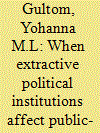| Srl | Item |
| 1 |
ID:
166478


|
|
|
|
|
| Summary/Abstract |
In some U.S. states that have undergone electricity market restructuring and deregulation, investor-owned utilities (IOUs) were required to divest the majority of their generation assets in order to purchase power from merchant generators, independent power producers, and power marketers competing in the new wholesale market. This paper examines the effect of the governance structures used to purchase power in the wholesale market, the bilateral forward contracts and market transactions, on the technical efficiency of IOUs during the post-divestiture period. Using a two-stage empirical strategy (the non-parametric data envelopment analysis and the difference-in-differences regression approach), I analyze the performance of 152 distribution utilities in the U.S. from 1994 to 2015. The results show that while the use of contracts has no significant effect, the use of market transactions has a significant negative effect on IOU technical efficiency. Trading arrangements in the restructured wholesale markets that rely on the concept of competition generate transaction costs that make it more costly for the utility to use market transactions rather than other alternatives. Thus, market transactions fall short to promote the efficiency purpose of IOUs as an economic organization in this policy-induced market and the adverse effect persists until 20 years after the divestiture.
|
|
|
|
|
|
|
|
|
|
|
|
|
|
|
|
| 2 |
ID:
177338


|
|
|
|
|
| Summary/Abstract |
This paper examines how extractive political institutions are associated with the performance of public-private partnerships (PPPs) using the case of the electricity sector in Indonesia, where a political regime shift has impacted the independent power producers’ (IPPs) arrangements in the power generation sector. Using a two-stage empirical strategy (data envelopment analysis and the difference-in-differences regression), I analyzed the economic performance of 20 coal-fired plants for the period between 2010 and 2016 that consists of IPPs endorsed by the two political regimes, both authoritarian and democratic, and the state-owned power plants. The results indicate that the extractive political institutions are associated with a reduced efficiency of the IPPs endorsed by the authoritarian Soeharto regime by −0.135 points, or 0.16% of the mean, showing that across all other power plants that produced the same output, the plants endorsed by the Soeharto regime used input or expenditure 0.16% higher than the average input or expenditure used by other plants. These findings are consistent with the political economy argument that extractive political institutions might have created economic policies that allow for the political elite to extract rents from PPPs.
|
|
|
|
|
|
|
|
|
|
|
|
|
|
|
|